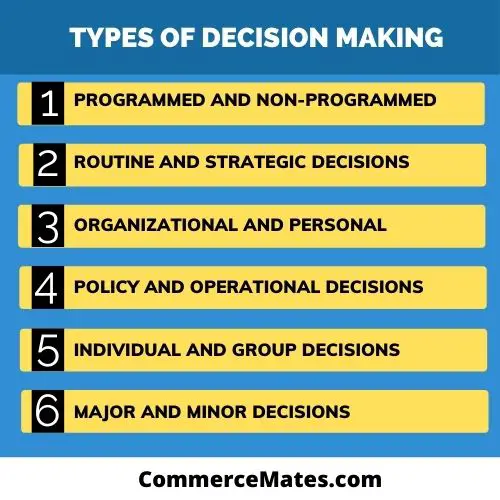Contents
What is Decision Making
Decision-making is a process of selecting the best course of action or plan from different alternatives available. It is a means through which managers take action for solving the problem. This is an integral part of the management system of the company which aims at improving efficiency. Decision-making is the one through which managers are able to take the right decisions at right time.
Types of Decision Making
Every organization needs to take distinct types of decisions for carrying out their activities efficiently. Major types of these decisions are as discussed below: –

Programmed and Non-programmed decisions
Programmed decisions are one that relates to the matters of routine type and problems that are of repetitive nature. These decisions are taken following the specific standard procedure for dealing with all such problems. Programmed decisions are basically taken by management at the lower level. Such decision involves like purchasing raw materials and spare parts, granting the leave to an employee, etc.
On the other hand, non-programmed decisions are meant for dealing with problems of difficult nature and which can’t be solved easily. These decisions arise out of problems that are not routine or daily occurring. There is no standard procedure for solving such issues. Non-programmed decisions are very crucial for an organization and are taken by upper-level management. Decisions at a higher level may include introducing new products in the market, setting up a new branch of business, and many more.
Routine and Strategic Decisions
Routine decisions relate to the decisions which are taken on a routine basis for the daily functioning of the business. These decisions can be taken quickly without much evaluation, analysis, and in-depth study. Generally, higher management delegates power to their subordinates for taking such decisions within the policy of business.
Whereas, strategic decisions are key decisions influencing the goals, objectives, and other crucial policy matters of the organization. These decisions require proper analysis and evaluation of distinct alternatives as they require an investment of funds. Strategic decisions are taken by the top and middle-level management teams. These also influence the routine decisions taken on a daily basis and hence require utmost care before taking them.
Organizational and Personal Decisions
Organizational decisions are decisions that are taken by an individual as an executive in his official capacity. These decisions are taken on the organization’s behalf and can be delegated to subordinates.
Whereas, when decisions are taken by an executive in his personal capacity, not relating to the organization then they are termed as personal decisions. Authority of taking personal decisions cannot be delegated to subordinates.
Tactical (Policy) and Operational decisions
Decisions that are concerned with distinct policy matters and the planning of business are called policy decisions. These decisions have a long-term influence on the performance of an organization. these decisions are taken by the top management team. These decisions include decisions related to the volume of production, the channel of production, location of business plants, etc.
Operational decisions related to daily operations and functioning of business enterprise. These decisions make it possible to implement the plan and policies taken by managers at the top level. Middle and low-level managers usually take these decisions.
Individual and Group decisions
Decisions taken by a single individual in his official capacity are called individual decisions. This decision type is more used by organizations that are smaller in size and have an autocratic management style.
Group decisions, on the other hand, are taken collectively by the management and employees of the business together. This group of individuals taking decisions are also termed as a standing committee and only the pertinent matters are referred to this committee. Group decisions mainly focus on involving a large number of individuals in their process of decision-making. Decisions taken by the board of directors of the company came in the category of group decisions.
Major and Minor decisions
Major and minor is another important type of classification of decisions. Major decisions relate to key aspects of business organization and are taken by top-level managers. The decision to buying new factory premises is a major decision.
Minor decisions are taken by peoples at lower levels in business organizations and are of less importance. Purchase of office stationery for daily use is a minor decision that can be taken by the office superintendent.